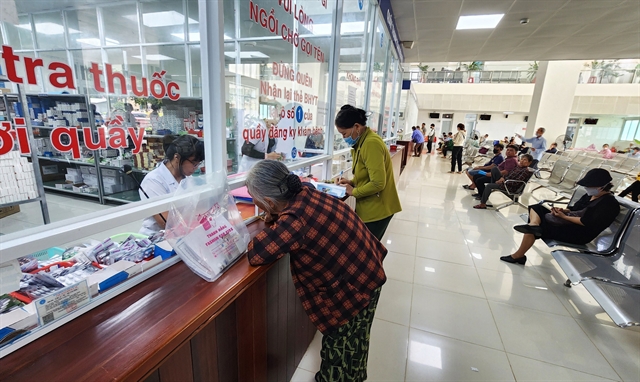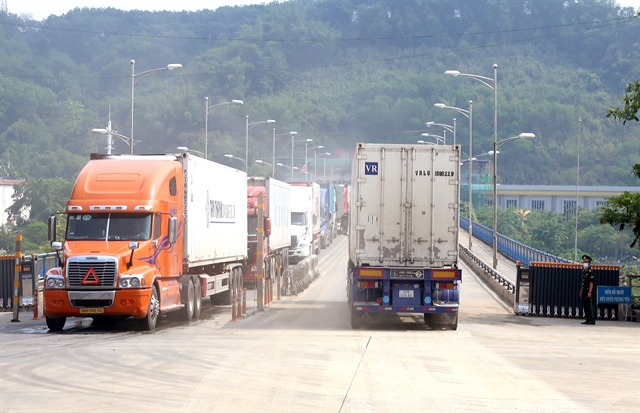 Opinion
Opinion


|
| A truck carrying fresh lychees waits to be processed at Kim Thành International Road Border Gate No. II for export to China. VNA/VNS Photo |
In the ongoing negotiations to enhance the ASEAN-China Free Trade Area (ACFTA), Việt Nam has assumed the pivotal role of chairing discussions on the Agreement pertaining to the application of sanitary and phytosanitary measures (SPS Agreement) between ASEAN and China. Director of Notification Office and National Inquiry Point on Sanitation, Epidemiology and Phytosanitary (SPS Việt Nam Office), Lê Thanh Hoà, sheds light on Việt Nam’s position and the opportunities it presents for the export of Vietnamese agricultural and aquatic products to China.
As the Chairman of the negotiation sessions on the SPS Agreement between ASEAN and China in ACFTA, how do you evaluate the development of Việt Nam’s SPS in the region as well as with China?
In recent times, Việt Nam’s SPS field has become a focal point, garnering considerable attention from the Ministry of Agriculture and Rural Development and related ministries. Actively participating in SPS negotiations within free trade agreements has bolstered Việt Nam’s position, particularly with major trading partners like China, Korea, Japan and Australia/New Zealand.
The system upgrade and the role of SPS Việt Nam have earned commendation from ASEAN, reflected in Việt Nam chairing the ACFTA negotiations on SPS. This not only strengthens collaboration with China's General Department of Customs but also enhances ties with units overseeing animal and plant quarantine, food safety, and import-export activities into China. This is anticipated to create more favourable conditions for Việt Nam and ASEAN to export goods to China in the future.
With this upgrade, the SPS content that Việt Nam previously had with ASEAN and China will be elevated to align with the standards of existing free trade agreements signed with other countries.
With this upgrade negotiation, what do you expect from further improving the quality of Vietnamese agricultural and aquatic products to this market of more than one billion people?
Within the framework of the excellent cooperation between ASEAN and China, particularly with the Guangxi Customs Department as the focal point for Chinese collaboration with ASEAN countries, we anticipate significant advancements. Numerous working groups addressing food safety, animal quarantine and plant quarantine have been established. These groups actively participate in exchanging information and certificates on food safety, as well as the quarantine of animals, plants, and aquatic products exported to China. This collaborative effort plays a vital role in facilitating trade, particularly between Việt Nam and China.
It serves to minimise the risk of counterfeiting animal and plant products quarantine certificates, addressing challenges encountered in the past. In the ongoing negotiations, the parties aim to reach agreements on technical content to streamline trade processes.
Notably, in the face of changes related to Sanitary and Phytosanitary (SPS) regulations, each party's responsibilities will be clearly communicated. The negotiation also includes the establishment of a mechanism to coordinate and address technical issues or inadequacies in technical barriers, fostering joint efforts to further promote trade.
Through the SPS mechanism, China reiterates its commitment to supporting ASEAN countries, including capacity strengthening in nations like Laos and Cambodia. Việt Nam, too, benefits from this commitment, receiving technical training from China. This training is designed to upgrade and strengthen the capacity of technical staff in stages, focusing on areas related to animal and plant disease diagnosis and food safety.
The number of warnings from markets regarding Việt Nam’s agricultural and aquatic products is decreasing. Through this, how do you evaluate the quality of Vietnamese agricultural products?
In 17 years since joining the World Trade Organization (WTO), Việt Nam has undergone comprehensive changes, from the legal system related to food safety, plant quarantine and even management agencies. Monitoring processes have also embraced advanced requirements.
Particularly in the realm of food processing, businesses are now required to adhere to international standards such as HACCP, ISO, and implement good production processes to ensure food safety. This involves monitoring potential hazards throughout the entire production chain, from growing and harvesting to pre-processing and final processing, aligning with market regulations.
The SPS Việt Nam Office actively collaborates with specialised units to provide comprehensive and timely information in accordance with market requirements. However, it is essential for businesses and manufacturers to ensure compliance, minimising risks during border control and customs clearance processes. This approach not only ensures adherence to regulations but also reduces overall costs for businesses.
The increasing adherence to SPS regulations is playing a crucial role in promoting the export of Vietnamese agricultural, aquatic products, and food. Moreover, it serves to solidify the reputation of Vietnamese products in the global market, affirming their position for quality and safety.
Deputy Minister of Agriculture and Rural Development Trần Thành Nam said there must be a "conductor" in negotiations on market opening. How do you evaluate the role and importance of this "conductor"?
The directives from the Ministry of Agriculture and Rural Development, in alignment with the Government's mandates, underscore the importance of reconciling interests in the process of market opening. This entails achieving a delicate equilibrium that considers the varied benefits for each category of animal, plant and food products.
The pursuit of harmonisation extends beyond the mere reciprocal opening of products; it also involves fostering collaboration among specialised agencies within the Ministry of Agriculture and Rural Development. This collaborative effort addresses issues, raises concerns, and ensures a nuanced balance throughout the negotiation process.
The SPS Việt Nam Office, acting as the focal point, is committed to performing this role effectively by regulating and coordinating between specialised agencies within the Ministry of Agriculture and Rural Development.
This includes facilitating collaboration with technical support points in Việt Nam’s SPS network, comprising units from the Ministry of Agriculture and Rural Development, Ministry of Industry and Trade, Ministry of Health, among others.
Additionally, the office is tasked with enhancing coordination between the Ministry of Agriculture and Rural Development and other key ministries and branches, such as the Ministry of Industry and Trade, the Ministry of Foreign Affairs, and industry associations. This comprehensive coordination is instrumental in navigating the complexities of market opening negotiations and ensuring a harmonised approach to the diverse interests involved. VNS




